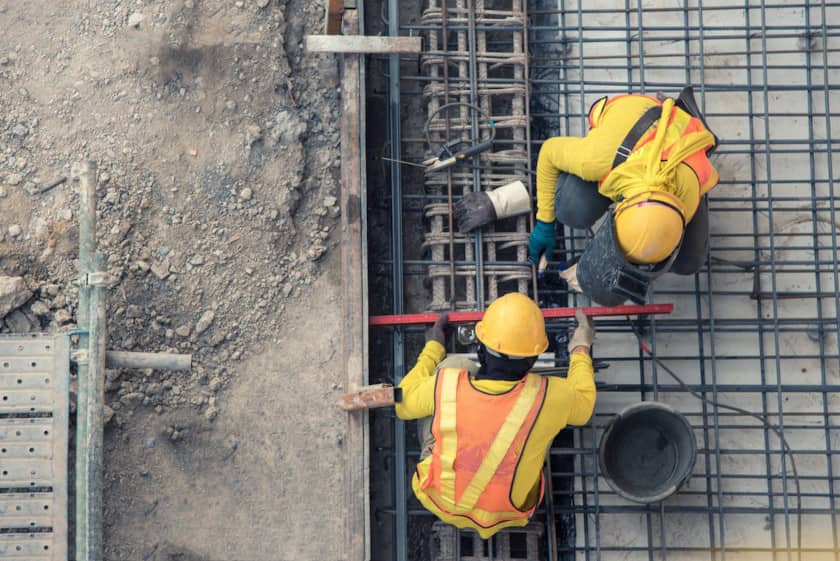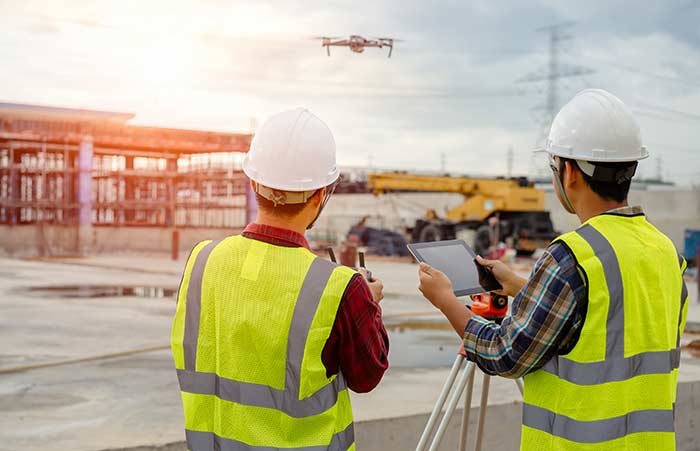Drones
One of the key construction tech innovations that will aid workers in the future is the integration of drones. Manually collecting data on-site likely leads to erroneous results.
Essentially, drones collect data with more precision and accuracy which makes them a better alternative compared to traditional methods. Construction companies saw the potential of integrating drones on-site and most of them have now found various uses for this type of tech.
Drones can be used to fly around construction sites and conduct sites surveys quickly and accurately. Their high-resolution imaging result in precise data that can be integrated into 3D topographical models and measurements. Another innovative benefit of using drones is that they can reach and scan every nook and cranny of a construction building and do it in a safe manner.
Virtual Reality
To better understand complex projects, construction tech has paved the way for virtual reality to help workers and contractors alike in the future. Virtual reality is most often used with Building Information Modelling (BIM) as both of these techs combine the best of both worlds.
BIM makes the building design and the use of virtual reality navigate the plan in a virtual platform. Initially, a realistic image of the project is produced before it is even completed.
Essentially, virtual reality not just helps workers in the future, but it addresses errors and mistakes in the early stage of the project thereby avoiding big changes and costly rework.
Wearables
This is one of the most innovative techs that will ensure the worker’s safety on-site. More than this, wearables enable productivity at work. Data shows that integrating wearable technology increases workers’ productivity by 8.5% and also worker satisfaction increased by 3.5%. Some of these notable wearable products available in the market include the XOEye Smart Glasses, Spot-r Wearable Sensors, and Redpoint Safety Vest Sensors.
AI Technology
For many years now, Artificial Intelligence (AI) plays an integral role in the construction industry. AI provides benefits such as increased safety for workers on-site, improved workflow, and finishing the job on time.
Essentially, more companies are experimenting on how to better navigate and employ AI technology in their business. More than this, AI has been helpful in tracking the real-time progress of workers, types of machinery, and equipment also used on-site.
By using artificial intelligence, potential risks on the job are addressed at a moment’s notice. As such, developing state-of-the-art AI technology has been the focal point of construction tech as it brings with it countless benefits that not just target worker’s safety but also ensure productivity.
Building Information Modelling (BIM) Technology

One of the notable technology that has been credited with construction tech is the integration of BIM technology. Every aspect of a project is managed digitally which allows contractors to create building designs virtually. This type of technology minimizes errors in the pre-planning stage of the project. Workers are assured on-site that they are working safely and securely.
BMI technology builds collaboration, reduces safety risks, and lowers project costs for rework and big changes. Essentially, BMI gives the complete picture of a project which makes it appealing for construction companies to utilize on their projects. In some other companies, it is even compulsory to use BIM technology for large-scale projects that require deep planning and brainstorming.
Robotics
It is an established fact that the construction industry is labor-intensive. This requires manpower and workers that can work under intense environmental conditions and fulfill heavy jobs of pushing and pulling equipment.
Indeed, it requires repetitive tasks done over the course of a day. Essentially, these tasks can be automated and done by robots. In turn, this ensures workers’ safety, and using a traffic cone for the same reason can now be automated.
Green Building Construction
Now more than ever, the focus on sustainability in the construction industry has been gaining traction. This is not just for the future of the industry but the current state of other industries as well.
Green building is a life-changing concept that uses environmental-friendly resources and materials for the construction of a project. This optimizes energy and recycling of resources to minimize waste and pollution. Essentially, the green building holds a promising future for the construction industry as it reaps benefits for both the workers and contractors alike.


